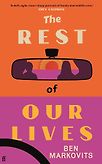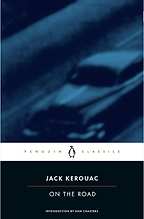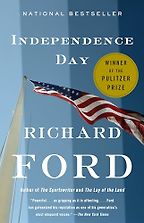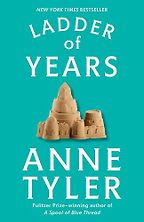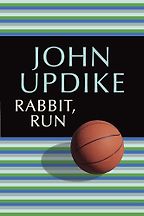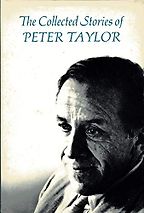What is it about a road trip that makes it a good basis or structure for a novel?
Good question. I think partly it is just an adventure story. The idea of a lot of adventure stories is that you walk out of the house, then something happens to you that changes you. The road trip is a version of that story, but it also has some difficulties as a structure for a plot. It’s hard to avoid making it feel a little—if you want the plot to build toward somewhere definite, you have to deal with the fact that the scenery and the cast keeps changing on the road.
I think that’s also the appeal of it: that stepping-out-the-door quality, where you are not quite sure what is going to happen next.
Yes, I suppose the ‘setting’ is more of a status: in transit. A condition conducive to rumination. Your latest novel, The Rest of Our Lives, features a man on a road trip considering his life.
The novel more or less starts when he drops off his daughter at university. So that marks a kind of epoch in his life; the period when he and his wife were looking after their kids is over, and they have to start some new kind of relationship.
The other thing is that the road trip allows him time away from his wife, so he has a little space, the solitude in which to consider how they reached this point. It’s hard to do that when you are constantly in company. Road trips are lonely. Have you driven across the States?
I once drove from Sacramento to Salt Lake City, along what they call ‘the loneliest road in America.’ And it was lonely. I mean, the landscape was extraordinary. But I felt very alone, it took a long time, and it put me in a strange state of mind.
Why Sacramento?
It was research for a book that never came to be. I remember it as a kind of limbo, a lost time.
The roads are lonely. You spend a lot of time in diners or restaurants, in cheap motel rooms. His marriage isn’t the happiest, but even so you get used to having that kind of buffer of love around you, without having to think about it. Suddenly, on the road you are no longer surrounded by people, and in a way you have nothing to keep you in one place or another, so you feel a little directionless. It’s a funny kind of paradox.
Do you think a theme running through your book choices might be something like running away—from modernity, or conformity, or life itself?
I think that’s right. I’ve always been attracted to stories about people who ‘opt out,’ it seems. I live a fairly conventional life, and I’m comfortable with it, but it does baffle me how easily one slips into making conventional decisions about something as existentially important as how you want to live. So stories about people who find a way or a moment in their lives where they can choose differently have always interested me.
I think that leads us pretty directly into your first book recommendation, the counterculture classic On the Road by Jack Kerouac. Why is this a must-read road trip novel?
It’s hard to have a road trip list without On the Road. I am not much of a beatnik, but you can’t help but admire the appetite for life that this book celebrates. Or, ‘celebrates’ is too strong, because they go through lots of miserable times.
One of the things I like is that when he sets off on this great, transcendent road trip that is the purpose of the book, he actually has dumb ideas about the clothes he should wear. He wears the wrong shoes. He tries to hitchhike on a road where there’s not enough traffic and ends up having to go back to New York City to take a bus. It doesn’t always end well. And the drink and the drugs produce a lot of ecstatic moments, but they produce a lot of unhappiness too.
“As soon as you can convince readers that you’re playing with real money, low-stakes bets feel suddenly important”
Even though it’s not an unmixed celebration, still, at the heart of it, there’s this appetite for life. He wants to see America, he wants to experience the world. That is, as we talked about earlier, what the road trip is about.
Right. It’s an outward journey and an inward journey all at once. Shall we keep moving? Your second choice is Richard Ford’s Independence Day.
That’s right. This is as far from ecstatic as you can get. This is a much more middle-aged road trip than On the Road. It’s the second of the Frank Bascombe series of books. The premise of the first—The Sportswriter—is that their kid has died and they are struggling to come to terms with the aftermath. Now, the guy who had been a writer in Independence Day has decided to give up writing and is going to get into real estate.
Real estate turns out to be existentially interesting to him, because where you make your home is a question that everyone faces. He’s setting out to visit his ex-wife, and to take their son on a trip to the various sporting Halls of Fame that are available to them.
The reason I really love the Bascombe novels, and this may be the most perfect example, is that Ford manages to make the minute-by-minute passage of time interesting. His characters aren’t always doing incredibly interesting things, but the context is so rich in their layered reminiscences and sense of what the stakes are, that you can just spend hours with him as he goes about his relatively boring road trip. I think that’s an amazing achievement.
I was talking about exactly this earlier today, in the context of Elizabeth Strout’s novels. People don’t have to be driving off cliffs for fiction to be completely absorbing.
My cheesy analogy is that a lot of novels seem to play with Monopoly money, in which case you have to buy more and more hotels and have more and more extravagant action for anything to seem to matter. But as soon as you can convince readers that you’re playing with real money, suddenly low-stakes bets feel very important.
I like that. Shall we talk next about Anne Tyler’s Ladder of Years? It’s been a long time since I read it as a teenager, but it made a big impact on me.
What impact did it make?
A fear of domesticity, I think. You have the sense that the main character, Delia, has sleepwalked through life. For the benefit of our readers, Ladder of Years is about a woman—a mother of young adults—who one day decides to walk out of her life and start again somewhere else.
They’re on a beach holiday as a family. She ends up hitchhiking and setting up in a new town. I think what’s great is that she ends up reproducing the domestic frustrations of the life she had left behind, because she turns out to be somebody who is really helpful, and can’t stop being helpful. I think that’s true of a lot of pioneering stories: you have this idea that you’re going to leave everything behind and start afresh, but inevitably you end up reproducing the world you left behind, because there was a reason that was your world in the first place.
Or that you are the one who created it, and the only thing you can’t run away from is yourself.
Yes, you’ve got to run somewhere. And wherever that turns out to be will have its own qualities and difficulties. So even if you’re not trying to escape yourself, as soon as your destination stops being vague and turns into somewhere specific, it will involve dealing with the usual worries about money and work and whatever it is that drove you away in the first place.
And I suppose there’s an enigma at the heart of Letter of Years, which is that the life she abandons—although it’s a rather ordinary life—doesn’t have anything obviously wrong with it.
Yes, it’s not a miserable family. Her kids are not awful. It’s okay. And in fact the life she makes for herself in the new town is not a disaster either. But in the end she comes back to her old life, because at some point—when there’s so little to choose between them—she may as well stick with the version where she has roots and where people love her.
I’d forgotten that. That’s rather poignant. And maybe it gestures at a central restlessness that many people can relate to in some way.
It’s not a road trip novel, but if I could I would have included Thoreau’s Walden on the list, because it is a classic opting-out book. He spent two years in his cabin in the woods. Although one of the frustrations of Walden is that he never totally explains why he leaves at the end of it, and goes back to what he somewhat mockingly calls ‘civilised life’ again.
Maybe he just got a little bored. He went there to get out of a rut. But there’s a danger that wherever you end up turns into another rut, and you will have to get moving again. I think it’s a great account of that desire to start again, even in a very minimalist way.
Rabbit, Run, by John Updike—the first in the series of novels featuring Harry ‘Rabbit’ Angstrom. I think of this as an archetypal midlife crisis novel. Do you agree?
Yeah. I mean, eventually. Although at the beginning he is only 26, although he is married with a kid, with another kid on the way. Midlife maybe began earlier then. He’s in a dead-end job. And, actually, I looked into the ‘midlife crisis’ term, and it was coined by a Canadian psychoanalyst who had in mind men in their mid-thirties. So he’s not so far off that.
Like Delia in Ladder of Years, he also leaves his family on a whim.
He’s determined to get the hell out of Dodge, and wants to drive to the coast although he never quite makes it because the tangle of American highways somehow obstructs him. He ends up moving one township away and shacking up with a woman that his old basketball coach introduced him to, and being no happier than he was before. He reproduces the same kind of domestic mess he was trying to escape from in the first place.
The road trip represents a common fantasy—that you can just get in your car and drive away, and never stop driving.
And we should talk about the car. I’ve done a couple of road trips across the States, and one of the things that happens is that the car becomes your home. It’s the only constant in your life. If you’re stopping in motels or camping or staying at friends’ houses, the car is the one place that you feel is consistent in your life.
The appeal of that in Rabbit, Run and all these other books is that in the car you have a home that you can take with you. You’re a turtle with a shell on your back.
A couple of years ago, I did a Five Books interview about the best hiking memoirs in which we reflected on how helpful it is to have that simple narrative thread—an A to B journey, that’s the arc—which then allows you to take wide meandering loops, emotional diversions, and so on. I suppose it’s the same for the road trip novel.
There’s a line about writing novels I once heard: that writing a novel is like driving on a mountain road late at night. You should know where you’re trying to get to, but all you need to see, moment by moment, is as far as your headlights. Something like that.
Anyway, The road trip novel makes that literal, you want to have some sense of a destination, but all you ever have to worry about is the next thirty yards. In the case of my book, he wants to drive to see his son at grad school in California. That’s the target. Also, his dad is buried there, so he has complex family reasons for wanting to make it to the coast. He knows he’s going to get there, and the question is, how.
Somebody once asked me if there was an English equivalent to the road trip novel. And there is, it’s just not in a car. It’s that hiking story. Or a biking story. Or Three Men in a Boat. Even classic English novels like Tess of the d’Urbervilles turn out to involve a lot of walking from one place to another. Because of the size of the country, you have this feeling when you walk out of one village and trek three miles to another village, you’ve actually gotten somewhere. The character of the place has changed.
Your final recommendation is actually a story: ‘1939’ by Peter Taylor, which can be found in his Collected Stories. It’s an autobiographical short story, I believe.
Yeah, it’s a couple of creative writing students. You don’t really think of 1939 as a heyday of creative writing, but they have gone to Kenyon College in Ohio to learn to write, and a couple of them decide to spend Thanksgiving weekend driving down to New York City to see their fiancés, and everything goes about as wrong as you might wish.
What it is really about is the gap between the sense they have of themselves when they set off, when they are bragging to their housemates and buddies that they may never come back, and the sense they have of themselves when they return, after having a little taste of the life that awaits them. They are still just college students hanging out with their pals at Kenyon, but they’ve had a glimpse of who they might slowly become.
I wonder if it waves at some central tension between the ideas that you will go on this journey and come back changed, but also that you will go on this trip and still be the same person at the other end. I think I believe both of those things at once.
I think that’s right. The genius is in the telling, in Peter Taylor’s case. There’s this wonderful episode—maybe this encapsulates it—where their car breaks down and they have to get a train back to university. And you have the rhythm of the train, which sticks in the mind of the narrator like a tune, and the rhythm has been turned into words, and the words are: Not yet, not yet, not yet.
You’ve not yet become the person that you will probably end up being. That phrase sticks with him even once he returns to his dorm room house and has A late snack with all his buddies, who have taken over their rooms because they have the nicest rooms in the house. They start having a midnight feast, and they return to that scene with all their friends having invaded what was their home. And that phrase keeps coming back to him: Not yet, not yet, not yet. Something’s coming.
There’s a sense of anticipation, of where the road will lead you, and who you might turn out to be at the end of it.
Interview by Cal Flyn, Deputy Editor
May 24, 2025
Five Books aims to keep its book recommendations and interviews up to date. If you are the interviewee and would like to update your choice of books (or even just what you say about them) please email us at [email protected]
Five Books interviews are expensive to produce. If you've enjoyed this interview, please support us by donating a small amount.

